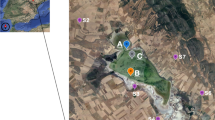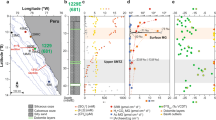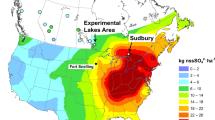Abstract
Sulphur pollution has closely been linked to the problems of acid precipitation and lake acidification1. Although variations in sulphur isotopes can in principle be used to fingerprint the sources of sulphur in the lacustrine environemnt (see refs 2–5), no attempt has so far been made to apply the technique in the study of pollutant sulphur in lakes in an historical sense. We report here the concentrations and isotopic composition of sulphur in sediments of several softwater lakes of northern Ontario. An objective of the study has been to ascertain whether the accumulation of sulphur in the sediments is related to the flux of pollutant sulphur into the lakes.
This is a preview of subscription content, access via your institution
Access options
Subscribe to this journal
Receive 51 print issues and online access
$199.00 per year
only $3.90 per issue
Buy this article
- Purchase on Springer Link
- Instant access to full article PDF
Prices may be subject to local taxes which are calculated during checkout
Similar content being viewed by others
References
Nriagu, J. O. (ed.), Sulphur in the Environment (Wiley, New York, 1978).
Krouse, H. R. in Handbook of Environmental Isotope Geochemistry (eds Fritz, P. & Fontes, J. Ch.) 435–471 (Elsevier, Amsterdam, 1980).
Nriagu, J. O. in Isotope Ratios as Pollutant Source and Behavior Indicators, 77–93 (IAEA, Vienna, 1975).
Nriagu, J. O. & Harvey, H. H. Nature 273, 223–224 (1978).
Cook, R. B. thesis, Columbia Univ., New York (1980).
Nriagu, J. O. & Coker, R. D. Nature 274, 883–885 (1978).
Nriagu, J. O., Wong, H. K. T. & Coker, R. D. Envir. Sci. Technol. 16, 551–560 (1982).
McQuaker, N. M. & Fung, T. Analyt. Chem. 47, 1462–1464 (1975).
Nriagu, J. O. & Coker, R. D. Limnol. Oceanogr. 21, 485–489 (1976).
Holt, B. D. & Engelkemeir, A. G. Analyt. Chem. 27, 1451–1453 (1970).
Schwarcz, H. P. Can. J. Earth Sci. 10, 1444–1459 (1973).
Nriagu, J. O. & Coker, R. D. Tellus 30, 365–375 (1978).
Nakai, N. & Jensen, M. L. Geochem. J. 1, 199–210 (1967).
Grey, D. C. & Jensen, M. L. Science 177, 1099–1100 (1972).
Krouse, H. R. Nature 265, 45–46 (1977).
Case, J. W. & Krouse, H. R. Oecologia (Berl.) 44, 248–257 (1980).
Studies of Lakes and Watersheds near Sudbury, Ontario (Ontario Ministry of the Environment, Toronto, 1981).
Mitchell, M. J., Lander, D. H. & Brodowski, D. F., Water, Air Soil Pollut. 16, 351–359 (1981).
Holdren, G. R. Jr. & Matisoff, G. Pap. at A. Meet. int. Ass. Great Lakes Research, Sault Ste. (1982).
Author information
Authors and Affiliations
Rights and permissions
About this article
Cite this article
Nriagu, J., Coker, R. Sulphur in sediments chronicles past changes in lake acidification. Nature 303, 692–694 (1983). https://doi.org/10.1038/303692a0
Received:
Accepted:
Published:
Issue Date:
DOI: https://doi.org/10.1038/303692a0
This article is cited by
-
Sulfur Geochemistry of a Lacustrine Record from Taiwan Reveals Enhanced Marine Aerosol Input during the Early Holocene
Scientific Reports (2016)
-
Landscape-scale patterns of sediment sulfur accumulation in Swedish lakes
Journal of Paleolimnology (2008)
-
Lake Sediment Core Records of Sulphur Accumulation and Sulphur Isotopic Composition in Central Ontario, Canada Lakes
Journal of Paleolimnology (2006)
-
Sulfur and oxygen isotope ratios in sulfate during an acidification reversal study at Lake G�rdsj�n, Western Sweden
Water, Air, & Soil Pollution (1995)
-
δ34S, δ18O, δ D in shallow groundwater: Tracing anthropogenic sulfate and accompanying ground water/rock interactions
Water, Air, and Soil Pollution (1995)
Comments
By submitting a comment you agree to abide by our Terms and Community Guidelines. If you find something abusive or that does not comply with our terms or guidelines please flag it as inappropriate.



